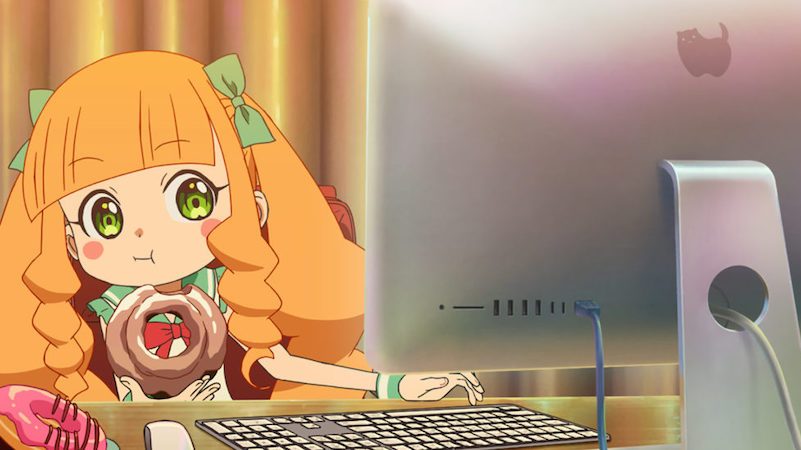Pompo the Cinephile is out this week, with a two-day preview currently happening at select locations and a theatrical release in select markets nationwide on April 29. The animated film is animated by Clap and directed by Takayuki Hirao. It was nominated for an Annie Award last year for Best Indie Feature.
“Pompo is a talented and gutsy producer in ‘Nyallywood,’ the movie-making capital of the world,” reads the official synopsis for the film. “Although she’s known for B-movies, one day Pompo tells her movie-loving but apprehensive assistant Gene that he will direct her next script: a delicate drama about an aging and tormented creative genius, starring the legendary and Brando-esque actor Martin Braddock, and a young actress seeking her first break. But when the production heads towards chaos, can Gene rise to Pompo’s challenge, and succeed as a first-time director?”
ComingSoon Editor-in-Chief Tyler Treese spoke with Pompo the Cinephile director Takayuki Hirao about the film, his legendary mentor, and its themes.
Tyler Treese: Pompo the Cinephile was really beautiful. It’s incredibly stylish and it blends comedy with a lot of emotion. How did you go about determining the tone of the film?
Takayuki Hirao: In regards to comedy and emotion or seriousness, the balance of it, I’m not sure if I had an inspiration, so let me think about it. So let me put that question aside. You mentioning the movie being stylish makes me really happy. In the end, the main part of Pompo is about editing, right? The climax is about editing. So, I thought by including a lot of different styles of transitioning in the movie, I really thought I was able to make it stylish, as you said. In regards to when I was creating the characters, I like doing this thing where the manga-like [characters] have raw emotions. So even though they look kawaii or cartoony, I like to include the struggles that real people actually feel. So maybe that’s that, that’s how I really got the good balance of being a comedy versus a serious emotional type of movie.
Speaking of the editing, I love that it wound up being 90 minutes exactly. How difficult was it to edit it down to meet that point in the film because Pompo says in the movie that 90 minutes is the perfect sweet spot?
Yeah, so editing was really hard. So in the movie, there’s a part where Gene couldn’t cut anymore and he has his head in his hands. I was exactly like that. Cutting scenes is just so hard. So, when I was cutting, the recording is already done, but even just taking out like one sound from that recorded dialogue, like that’s how really down to the details is what I got to cut.
You worked as a production assistant under the legendary Satoshi Kon for Millennium Actress. With that background, did you see a lot of yourself in Gene?
Yeah, I do think I am influenced by my experiences there. So director Kon, what I learned from him wasn’t really like, not like the technical aspects. He really was the type to be like, “Just watch and learn or try to steal and learn from me.” But what he really taught me was how to like the kind of mindset to have when creating something. So how to be a director, how to act like a director, is really what he taught me. So, I do think I was influenced, especially I think I was influenced in the way that I transitioned in this movie.
Yeah, I can definitely see it in the transitions in the film. Within the film, we see the sacrifice that people go through in order to create art for others, how it can be so damaging to their personal lives. How did that theme strike you and how do you find a balance?
So, about like 20 years ago, when I was 20-years-old, I entered the industry and for me, I don’t think it was really a sacrifice because I was having so much fun, but I guess I didn’t have any breaks or vacations. When I say this, there are like labor laws and there are issues, but I never had weekends. Like on the weekends I was working, but it was so much fun. I didn’t get to travel, but I feel like I got to travel in my works that I worked on. So, as a sacrifice, I really think like from the outside, maybe people think like, “Oh, that’s, that’s so sad that you had to work so much,” but I actually don’t think so.
The character of Martin Bradock is based on Marlon Brando. Were there any specific performances or films of Brando that you drew from for this character?
The voice actor acting as Martin is a voice actor named Mr. Akio Ōtsuka, but he is known to be the Marlon Brando of Japanese voice actors. So, he really has this air of being very much like Marlon Brando. So, I actually didn’t say much to him.
You worked on Paranoia Agent, which is one of my favorite shows. How do you view its legacy almost 20 years later?
So, Paranoia Agent is a TV series by Satoshi Kon and I talked about before, but I did participate as the assistant giving direction. So the fact that I was able to work under director Kon, it really created the foundation of how my work is as a director. I can feel like what I learned from him is the style from him, or the work ethic I still have inside of me. So, yeah. Even after 20 years, I really feel the weight of what I learned under him.










